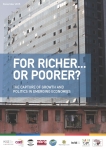
For Richer of Poorer : The Capture of Growth and Politics in Emerging Economies
Author : Alice Krozer is a Doctoral Researcher at the Centre of Development Studies at the
University of Cambridge
The emerging economies Brazil, Russia, India, China, South Africa, Mexico, Indonesia and Turkey – henceforth the BRICSAMIT – have come to be considered the economic powerhouses of recent decades, fostering a narrative of the growth of the South. Not only have these countries managed to reduce extreme poverty; most have embarked on a steep economic growth path and play an increasingly influential role on the global scene. But an emphasis on growth masks another, worrying trend. Today, all eight BRICSAMIT countries occupy the top ranks as some of the most unequal countries in the world. The price these countries – and millions of their citizens – pay for this is high. Excessive inequality hampers development prospects: negatively impacting growth potential, threatening poverty reduction, leading to mass migra-tion flows and ‘brain drain’, and reducing opportunities for young people.
Inequality affects all aspects of a person’s life and life chances, from health and education to living environment and prospects for old age. Extreme inequality perpetuates high levels of violence and crime, fuels mistrust and undermines social cohesion. It is now clear that the gains of economic growth in the BRICSAMIT have been captured by the very richest. Fortunes have been made by large corporations engaged primarily in the extractives, agribusiness, infrastructure, media and telecom - munications sectors. The capture of power by economic elites, including companies, drives inequality by ensuring the rules remain rigged in favour of the rich, who grow increasingly influential.
This concentration of wealth and power in the hands of the few is clearly at the expense of the many. It reinforces existing social structures, perpetuating inequality and excluding millions of people from an equitable share in prosperity.
| Attachment | Size |
|---|---|
| 6.59 MB |


